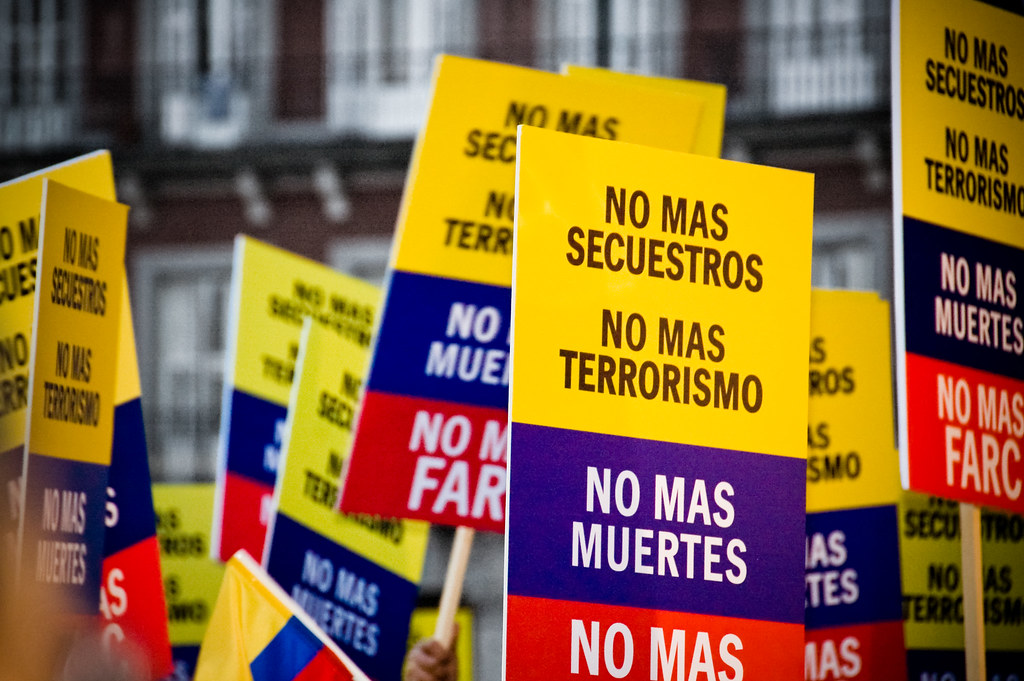In 2020, 300 families were forced to flee the rural town of Totumito, Colombia after the massacre of eight civilians, permanently abandoning their homes. They sought safety from the violence that has proliferated throughout the country since the 2016 peace accords which formally ended the fifty-year-long civil war between the Revolutionary Armed Forces of Colombia (FARC) and the Colombian government. Since these accords, much of Colombia seems to exist in this liminal space; the country is caught between promised peace and escalating violence.
In 2016, then-President Juan Manuel Santos signed a revolutionary peace deal with the FARC, agreeing to an end of the war between the Marxist militia group and the Colombian army that had claimed over 200,000 lives. In 2018, however, following the election of Ivan Duque, the government—now dominated by the right-wing Democratic Center party—began to aggressively roll back many of the pledges made in the 300-page peace agreement. The effects, both external and symbolic, of the 2018 election cannot be understated. In bringing the FARC into political discussion, the peace deal initially lowered Colombia’s homicide rate and demonstrated a path toward solving terror and drug-related conflicts that did not involve a total-war mentality. In subverting this deal, Duque illustrated the fragility of peace without a framework that accounts for the social and economic problems that continue to plague those most vulnerable to FARC. In order to reverse course, Duque must begin implementing the social development programs within the peace accords in order to salvage what is left of the peace and protect the populations most at risk to the violence that has terrorized Colombia since 1964.
After a year in office, Duque implemented only a quarter of the accord’s 600 provisions, slowing the rate of implementation and in turn weakening the deal’s effects. Duque has specifically opposed a special tribunal which would investigate war crimes and award the transparency of 13,000 former FARC members with immunity in exchange for open dialogue. Echoing those who seek more punitive measures against the guerrilla organization, Duque claims that this provision offers too much latitude to the FARC. This opposition to the tribunal—a cornerstone of the accords—has set a precedent for Duque’s continued intransigence.
Further, while a panel of Colombian judges later overturned the initial rejection of the tribunal, Duque has continued to oppose other programs within the peace accords. For instance, a volunteer-basis crop substitution program has been continuously underfunded, leaving many coca farmers that want to transition to legal crops unable to do so. Instead, Duque has continued the legacy of Former President Álvaro Uribe in advocating for fumigation with glyphosate—a practice which was suspended by the Santos administration and included in the peace accords only as a final alternative. Taking advantage of the COVID-19 pandemic and the lack of internet access amongst the rural population, the Duque administration has pushed forward virtual meetings that would reinstate glyphosate fumigation, rather than implementing the provisions dictated by the accords and supported by the Colombian rural populace.
Additionally, the Duque administration has not reintegrated former FARC fighters into society—yet another provision of the accords—nor has it developed rural land formerly held by FARC and democratized property rights. The failure to implement these modernizing and democratizing programs, has led to other illegally armed groups taking control of this land, proliferating conflicts between leftist guerrilla groups like the National Liberation Army (ELN) and other rightwing paramilitaries.
Duque’s supporters argue that the developmental aspects of the peace accords could take more than a decade to implement. Emilio Archila, an adviser to Duque, claims “We are talking about reaching 6 million people scattered across that never had these services in the past 200 years.” This argument, however, does not take into account the fact that Duque has refused to use funds originally allocated to the accord for these programs. Instead, he has been diverting the “peace money” for his own personal uses like social media campaigning and polling. This defense also does not address that these “services” have not yet been offered to the majority of the rural poor. This is not a justified setback, but a willful refusal to begin development projects.
Rather than fund these solutions that would address rural poverty and underdeveloped infrastructure as the root causes of the FARC, Duque has instead followed Uribe’s precedent and remilitarized the conflict. The army chief has ordered soldiers “to double the number of criminals killed, captured, or forced to surrender.” Echoed here is the false positives scandal, in which the army, without any executive oversight, killed civilians they then masqueraded as guerillas in order to meet military quotas. Duque has only encouraged a return to this violent tradition, appointing a general linked to the false positives scandal as head of the army and reinstating many of the practices that defined the Uribe era.
This failure to prioritize social and developmental programs has consequently escalated the conflict. Since 2016, 700 community leaders have been killed; since the COVID-19 lockdown began in March, 32 “human rights defenders” have been killed, as well as six former combatants. In 2019, former FARC commanders Ivan Marquez and Jesus Santrich, both of whom were early supporters of peace talks, announced their intention to re-mobilize and begin a “new phase of armed struggle” against the Colombian government. A year after this announcement, 1,800 former FARC fighters have once again taken up arms. As of May 2020, these FARC dissident groups have as many as 2,300 members.
After decades of war, intervention, and drug-related violence, United States officials prefer to paint a picture of a “Colombian miracle” that has done “all the right things to try to bring stability, democracy, and prosperity.” This is remarkably untrue. It is easy to claim that the violence since the election of Duque is only a temporary setback, easier still to claim that there has been no setback. In Colombia, however, war continues without any attempts to address the fundamental issues underlying the continued violence.
Image: Camilo Rueda López (Flickr)
